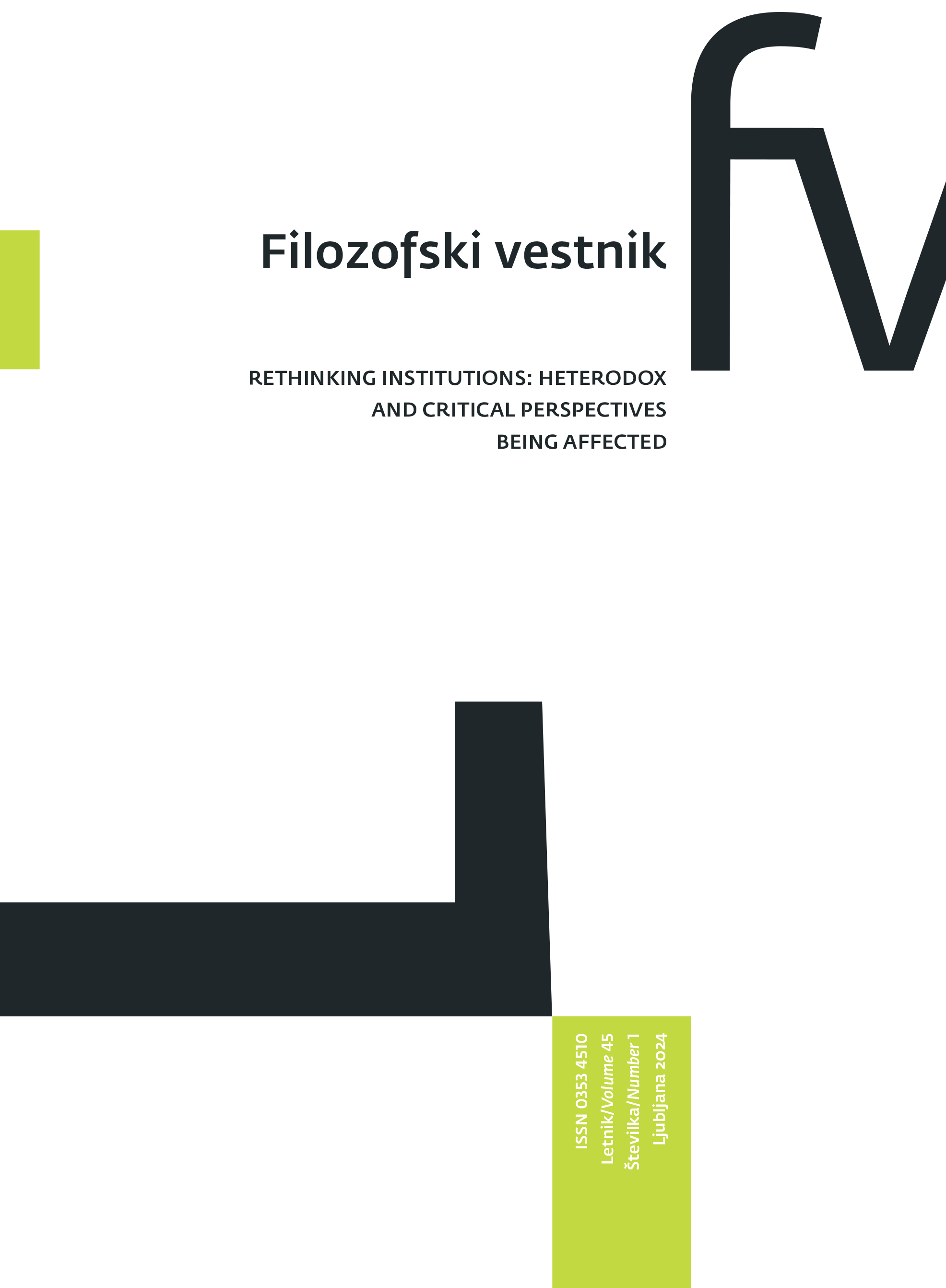Interval in dogodek
sedanjost kot vmesni čas pri Gillesu Deleuzu in Alainu Badiouju
DOI:
https://doi.org/10.3986/fv.45.1.10Ključne besede:
čas, dogodek, sedanjost, sodobnik, politika, Alain Badiou, Gilles DeleuzePovzetek
Ali živimo v »vmesnem času«? Če je tako, kaj pomeni biti »sodobnik« takega časa? Članek raziskuje časovno-filozofsko operacijo, povezano s poimenovanjem »vmesnega časa«, izhajajoč iz njenega doslednega pojavljanja v različnih obdobjih. Preučuje funkcijo, ki jo ta operacija prevzema pri mišljenju časa, oz. specifično konstrukcijo časa, ki jo vzpostavlja. S poudarkom na delovanju intervalle pri Alainu Badiouju in entre-temps pri Gillesu Deleuzu obravnavamo dva nasprotujoča si odnosa do sedanjosti, ki ju izraža pojem »vmesnega časa«. Članek pokaže, da pri obeh filozofih vmesnost zavzema ključno mesto v njuni filozofski konstrukciji časa – vendar v obratni obliki. Razprava o tem kontrastnem načinu nato pripelje do končnega vprašanja, ali obstaja nekaj takega kot temeljna vmesnost, ki se kaže skozi vse čase in pripada času kot takemu.
Prenosi
Literatura
Badiou, Alain. The Century. Translated by Alberto Toscano. Cambridge: Polity, 2007.
Badiou, Alain. Images of the Present Time, 2001–2004. Translated by Susan Spitzer. New York: Columbia University Press, 2023.
Badiou, Alain. Logics of Worlds: Being and Event, 2. Translated by Alberto Toscano. London: Continuum, 2009.
Benčin, Rok. “Rethinking Representation in Ontology and Aesthetics via Badiou and Rancière.” Theory, Culture and Society 36, no. 5 (September 2019): 95–112. https://doi.org/10.1177/0263276418806573.
Deleuze, Gilles. The Logic of Sense. Translated by Mark Lester and Charles Stivale. Edited by Constantin V. Boundas. New York: Columbia University Press, 1990.
Deleuze, Gilles, and Félix Guattari. What is Philosophy? Translated by Hugh Tomlinson and Graham Burchell. New York: Columbia University Press, 1994.
Diefenbach, Katja. “Über das Un/Sinnliche. Ereignis- und Zeitbegriffe in Deleuzes und Badious Ontologien unendlicher Mannigfaltigkeit.” In “Sensibilität der Gegenwart. Wahrnehmung, Ethik und politische Sensibilisierung im Kontext westlicher Gewaltgeschichte,” ed. B. Liebsch, 151–76. Special issue, Zeitschrift für Ästhetik und Allgemeine Kunstwissenschaft 17 (2018).
Gramsci, Antonio. Selections from the Prison Notebooks. Edited and translated by Quintin Hoare and Geoffrey Nowell Smith. New York: International Publishers, 1992.
Groys, Boris. “Comrades of Time.” In E-flux Journal: What is Contemporary Art?, edited by Julieta Aranda, Brian Kuan Wood, and Anton Vidokle, 22–39. Berlin: Sternberg Press, 2010.
Hardt, Michael. Gilles Deleuze: An Apprenticeship in Philosophy. Minneapolis: University of Minnesota Press, 1993.
Nietzsche, Friedrich. Human, All Too Human, I: A Book for Free Spirits. Translated by Gary Handwerk. Vol. 3 of The Complete Works of Friedrich Nietzsche. Stanford: Stanford University Press, 1997.
Nietzsche, Friedrich. Nachgelassene Fragmente, 1880–1882. Edited by Giorgio Colli and Mazzino Montinari. Vol. 9 of Kritische Studienausgabe. Munich: Deutscher Taschenbuch Verlag, 1988.
Nietzsche, Friedrich. “On the Utility and Liability of History for Life.” In Unfashionable Observations, translated by Richard T. Gray, 83–167. Stanford: Stanford University Press, 1995.
Nietzsche, Friedrich. Thus Spoke Zarathustra. A Book for All and None. Edited by Adrian Del Caro and Robert B. Pippin. Translated by Adrian Del Caro. Cambridge: Cambridge University Press, 2006.
Völker, Jan. “Das demokratische Subjekt und die Korruption der Zeit.” In Absolute Gegenwart, edited by Marcus Quent, 28–48. Berlin: Merve, 2016.
Williams, James. Gilles Deleuze’s Philosophy of Time. Edinburgh: Edinburgh University Press, 2011.
Šumič Riha, Jelica. “Contemporary Thought and the Crisis of Negation.” Crisis and Critique 1, no. 3 (July 2014): 59–83.
Prenosi
Objavljeno
Kako citirati
Številka
Rubrike
Licenca
Avtorske pravice (c) 2024 Avtorji

To delo je licencirano pod Creative Commons Priznanje avtorstva-Deljenje pod enakimi pogoji 4.0 mednarodno licenco.
Avtorji jamčijo, da je delo njihova avtorska stvaritev, da v njem niso kršene avtorske pravice tretjih oseb ali kake druge pravice. V primeru zahtevkov tretjih oseb se avtorji zavezujejo, da bodo varovali interese založnika ter da bodo povrnili morebitno škodo.
Podrobneje v rubriki: Prispevki





